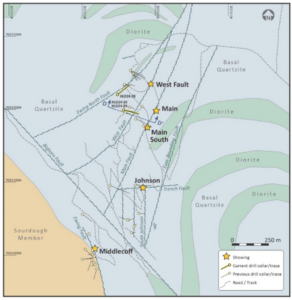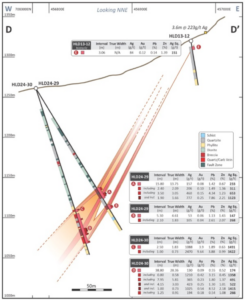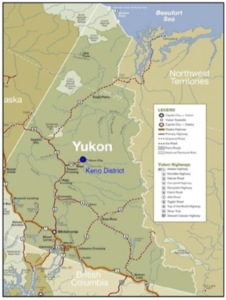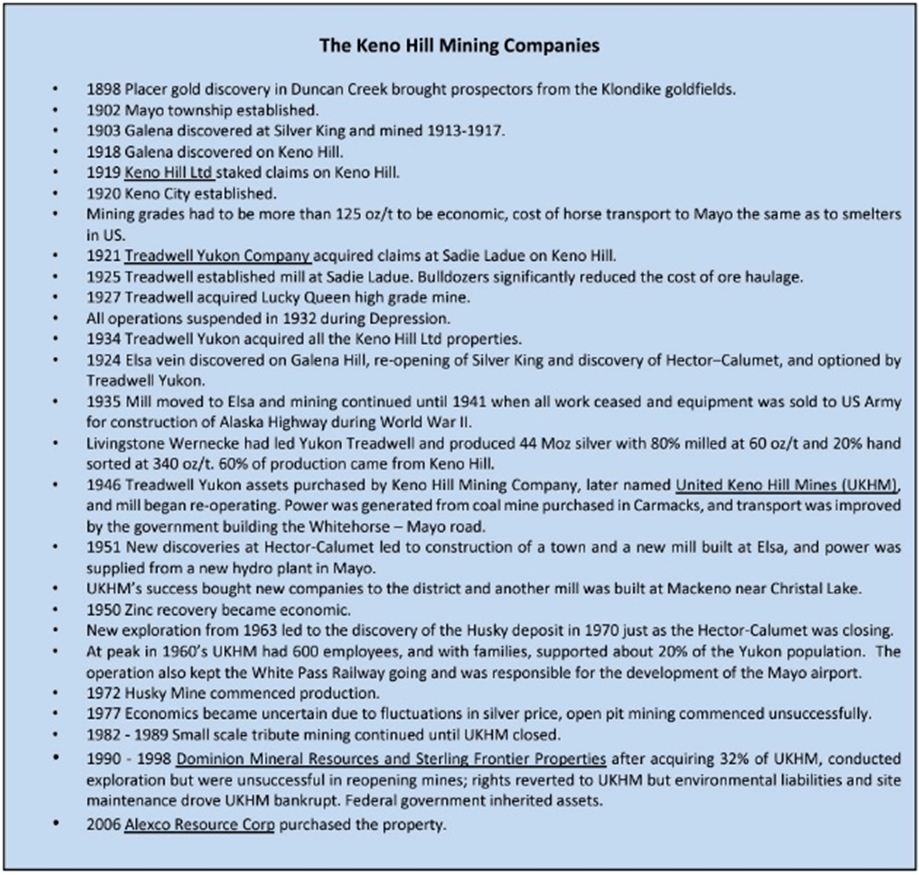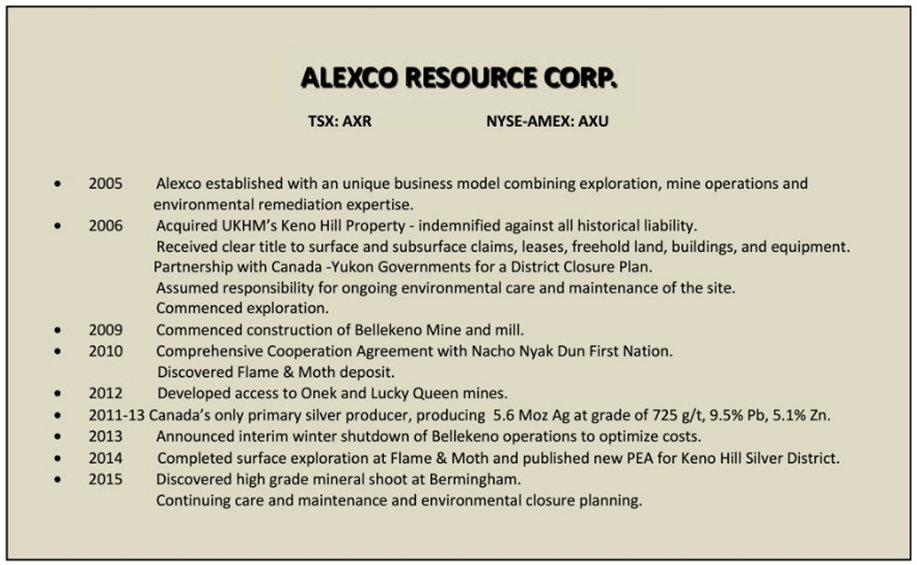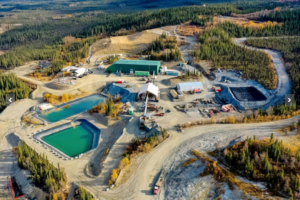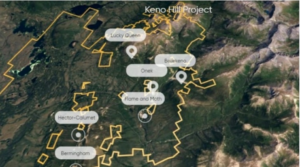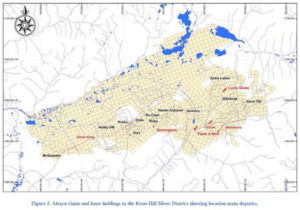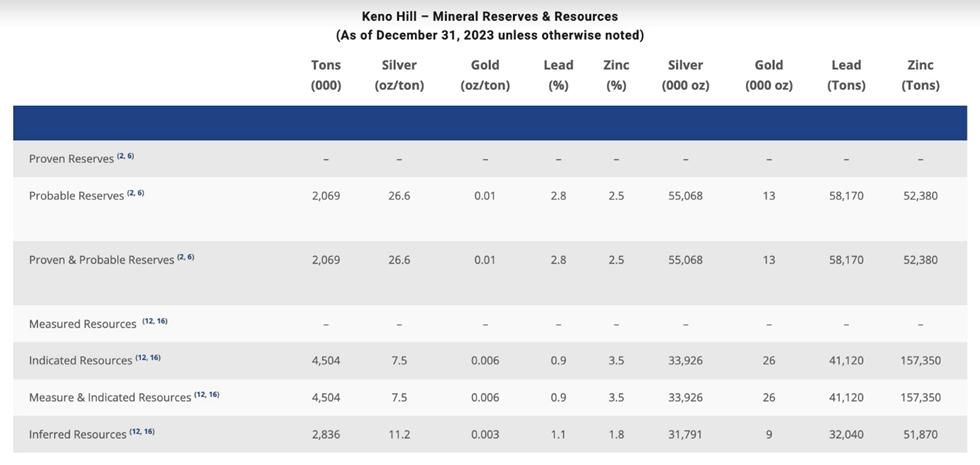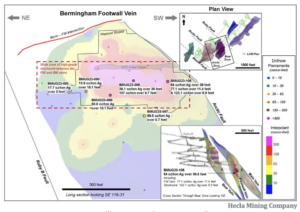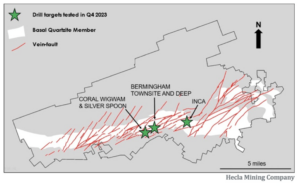
Rick Mills – “Silver North makes third discovery at Haldane, within Yukon’s Keno Hill high-grade silver mining district”
“You have to be good to be lucky” is a saying that applies to several aspects of life, from gambling and golf to stock picking and mineral exploration.
Main Fault discovery
On Nov. 14 Silver North Resources (TSX-V:SNAG) (OTCQB:TARSF) announced a new discovery — the Main Fault at its Haldane silver project within the historic Keno Hill Silver District in the Canadian Yukon Territory.
Drilling confirmed that the Main Fault, marked by a series of silver-bearing surface showings, is indeed a productive structure hosting multiple high-grade silver-bearing veins and breccias. A total of 732 meters of drilling was completed in three holes testing the West Fault and Main Fault targets.
The 8,579-hectare Haldane property is located 25 km west of Keno City, YT, adjacent to Hecla Mining’s producing Keno Hill silver mine, and hosts numerous occurrences of silver-lead-zinc-bearing quartz siderite veins as seen elsewhere in the district.
“We consider this a new drill discovery at the Main Fault defined by multiple high grade silver intersections over three separate vein – fault zones. The continuity demonstrated over the 50 metres between holes, and the increased grades and thicknesses encountered down dip in HLD24-30 are extremely encouraging,” Silver’s North’s President and CEO Jason Weber said in the Nov. 14 news release. “We can now elevate the Main Fault to an important silver target where we can potentially delineate new silver resources along with the West Fault target. We will continue to refine our interpretation of these new results to optimize an aggressive drill program to test the Main Fault in 2025.”
The Main Fault, thought to be a parallel structure to the West Fault, was targeted in the 2024 drill program based on surface sampling of the fault at the Main and Main South showings where oxidized vein samples on surface average 151 g/t silver over 7.6m and 223 g/t silver over 3.6m. Two holes tested this target (HLD24-29 and 30), successfully intersecting a wide structural zone consisting of three siderite-sulfide vein faults and breccias with an interstitial stockwork of siderite-bearing veinlets and brecciated host rocks that forms the overall structural zone.
Silver North adds fourth target at Haldane, as 2024 drilling concludes — Richard Mills
In hole HLD24-29, the widest structural zone returned 13.75m true width of 157 g/t silver, 1.42% lead and 0.67% zinc and blossomed to 28.36m (true width) of 130 g/t silver, 0.55% lead and 0.52% zinc 50 meters down dip in hole 30. High-grade oxidized and brecciated siderite vein fault material at the upper boundary returned 1.83m (true width) of 1,088 g/t silver, 3.90 g/t gold, 1.89% lead and 0.63% zinc including 0.73m (true width) of 2,470 g/t silver, 9.64 g/t gold, 3.88% lead and 0.99% zinc in hole HLD24-30. It is notable that these upper boundary intersections are unusually high in gold compared to other intersections at the Haldane property.
High-grade, partially oxidized and strongly brecciated siderite vein fault from the center of the Main Fault structural zone returned 3.05m (true width) of 460 g/t silver, 0.15 g/t gold, 4.34% lead and 1.23% zinc, including 1.65m (true width) of 777 g/t silver, 0.25 g/t gold, 7.86% lead and 2.22% zinc in HLD24-29 and 5.8m (true width) 365 g/t silver, 0.23 g/t gold, 1.80% lead and 1.37% zinc 50m down dip from HLD24-30.
The best result from the lowermost unoxidized siderite vein and vein fault breccia was an intercept of 0.91m (true width) of 194 g/t silver, 0.18 g/t gold, 0.54% lead and 1.08% zinc from HLD24-30.
Haldane property drill plan map
Cross section HLD24-29 and 30
Bighorn and West Fault
Main Fault is the third discovery Silver North has made since acquiring the Haldane property.
The corporate presentation shows historical small-scale mining — underground workings developed at the Middlecoff and Johnson veins — produced 24.7 tons of 3,102 g/t silver and 59% lead, and 2.1 tons of 4,600 g/t silver.
The property showed the potential to double the combined strike length of known veins currently totaling 12 km, with new discoveries in 2019 and 2020 at West Fault and Bighorn.
The company found almost 2 ounces (1 troy oz = 31.2 grams) of silver in soils at Bighorn with high lead concentrations.
“We drilled one hole into that target and found new Keno-style veins and so that was kind of the proof in the pudding for us, that this was a potentially viable target,” said CEO Jason Weber.
The Vancouver-based company says the project is located adjacent to, and has the same rocks as Hecla’s high-grade Keno Hill silver mine.
Approximately 12 kilometers of cumulative vein exploration potential exists at the Haldane project, with the 31 drill holes completed from surface to date testing less than 800 meters. The best mineralization occurs where the mineralized structures cut the Keno Hill quartzite unit — a similar geological setting for mineralization as at the main Keno Hill deposits mined for over 100 years.
In 2021 Silver North announced a new discovery at the West Fault Zone, where drilling intersected 311 g/t silver over 8.7 meters (true width). This was followed by 3.14m of 1,351 g/t silver.
According to Silver North, this new zone has been traced over a 100- by 90-meter area with room to expand along strike and at depth.
Silver North’s goal is to find Keno-type mineralization and at least 300 grams-per-tonne rock over a comfortable mining width of 4 meters. They achieved that with the West Fault discovery of 311 g/t Ag over 8.7m.
Takeaways
In talking to Jason Weber on Tuesday, Nov. 12, two takeaways from Silver North’s progress to date jumped out at me.
First, discovery after discovery from first-time drilling makes Haldane a very prospective project. Rarely is a discovery made after completing just three drill holes; usually it takes tens, sometimes hundreds.
“Our success rate in drilling new targets has been pretty good,” Weber commented with understatement. “We drilled Bighorn, where drilling had never been attempted and with the very first hole we hit silver veins, then at West Fault we made a new discovery a few years later, and now here at Main Fault so I think it just speaks to the prospectivity of the Haldane property.”
My second takeaway is the fact that the holes at Main Fault were drilled shallower than at West Fault, and SNAG is intersecting multiple veins with each hole.
“The Main Fault is really significant in that it’s one of the widest zones we’ve ever seen and it’s got multiple structures in it so when you start to put that together with future drill programs we’re not drilling a 225- or 250-meter hole to get one vein, we’re drilling maybe that same depth but we’re hitting a big wide zone that might have three separate veins in it and so when you think about how are you going put together a meaningful silver resource, you can just see it’s going happen that much faster with a target like Main Fault,” Weber said, adding “we’re really excited just about the overall width and continuity of this discovery because we know from elsewhere in the district that the grades can get better.” (even than 1,088 grams silver over 1.8m — Rick)
Silver North offers investors exposure to one of the most prolific silver districts in Canada and the world — Keno Hill — which is seeing major investment from Hecla Mining, the largest silver producer in the United States, following Hecla’s 2022 takeover of Alexco Resources.
Silver North’s underexplored Haldane project demonstrates high-grade, high-width potential akin to the veins being mined at Keno Hill.
Silver North focused on Keno Hill Silver Mining District — Richard Mills
Keno Hill Silver District — a short history
Keno was not only Canada’s second largest primary silver producer and one of the richest silver-lead-zinc deposits ever mined, it was also a mainstay of the Yukon economy, keeping the territory flush from the 1920s to the early ‘60s following the decline of the Klondike Goldfield.
At its peak, Keno Hill supported about 15% of the territory’s population and produced more wealth than the Klondike, one of the richest placer gold districts in the world.
According to the Yukon government, from 1913 to 1989, 4.87 million tonnes were mined at an average grade of 1,389 grams per tonne silver, 5.62% lead and 3.14% zinc. Over 65 deposits and prospects have been identified in the district. Most occur within the Keno Hill quartzite as structurally controlled veins close to the Robert Service Thrust Fault.
The district is about 450 km north of the Yukon capital, Whitehorse.
Source: Mineralogical Association of Canada
Following a small amount of hand mining between 1913 and 1917, larger scale production was almost continuous from 1919 to 1989, except during World War II. Two companies produced most of the ore, Treadwell Yukon Corp. from 1925 to 1941, and United Keno Hill Mines between 1947 and 1989. [Both companies went bankrupt due to periods of sustained low silver prices.]
Silver production is recorded from 35 mines with seven producing over 10 million ounces each, with the largest being Hector‐Calumet (96 Moz) and Elsa (30 Moz). — Mineralogical Association of Canada, ‘The Keno Hill silver mining district’ (2016)
The Mineralogical Association of Canada (MAC) points out that between 1913 and 1989, the Keno Hill Silver District produced more than 214 million ounces from greater than 35 mine sites containing some of the richest silver-lead-zinc veins in the world, averaging 44 ounces per tonne silver, 6.7% lead and 4.1% zinc.
The Bellekeno mine that commenced production at the beginning of 2011 was Canada’s only operating primary silver mine and until 2013 produced 5.2Moz silver at an average grade of 25 oz/t.
Two important new discoveries were at Flame & Moth and Bermingham.
Source: Mineralogical Association of Canada
Geology
Although staked for its silver mineralization, the Keno Hill property is located within the Tintina gold belt, a zone of gold deposits associated with Cretaceous Tombstone suite granitic intrusions. Significant deposits hosted within the Tintina gold belt include Victoria Gold’s nearby Eagle Gold & Dublin Gulch, Golden Predator’s Brewery Creek, Rockhaven’s Klaza project, in addition to numerous prospects including Gold Dome, Clear Creek and Red Mountain and others. — Metallic Minerals website
According to the MAC,
Mineralization in the District is of the polymetallic silver-lead-zinc vein type where multiple pulses of hydrothermal fluids or fluid boiling, probably related to repeated reactivation and breccia formation along the host fault structures, have formed a series of vein stages with differing mineral assemblages and textures. Supergene alteration may have further changed the nature of the mineralogy in the veins. Much of the supergene zone may have been removed due to glacial erosion. In general, common gangue minerals include (manganiferous) siderite and, to a lesser extent, quartz, and calcite. Silver predominantly occurs in argentiferous galena and argentiferous tetrahedrite (freibergite).
In some assemblages, silver is also found as native silver, in polybasite, stephanite, and pyrargyrite. Lead occurs in galena and zinc in sphalerite, which can be either an iron-rich or iron-poor variety. Other sulphides include pyrite, pyrrhotite, arsenopyrite, and chalcopyrite. The Keno Hill mining camp has long been recognized as a polymetallic silver-lead-zinc vein district with characteristics similar to other well-known mining districts in the world.
Alexco and Silver Wheaton silver stream
In 2006, Alexco Resource Corp purchased the United Keno Hill Mines claims, which encompassed the western portion of the 240-square-kilometer district, and commenced exploration which initially focused on the area associated with the Bellekeno mine. In March 2019, Alexco published results of a Prefeasibility Study which cited a life-of-mine grade exceeding 804 g/t.
Keno Hill mine. Source: Alexco Resource Corp
The eastern portion of the district, which hosted eight former producing mines and five with the highest grade, was never acquired by UKHM, but remained held by numerous private groups and families who maintained their claims in good standing for decades. — Metallic Minerals website
MAC noted that until the end of 2015, Alexco’s work included historical data capture, aerial and ground geophysics, geochemical surveys, geological mapping, 142,240 meters of surface diamond drilling, 1,1150m of RC drilling, and 24,880m of underground drilling.
The silver resource inventory increased to 45.9Moz indicated resources and 12Moz inferred, with exploration targeting five deposits: Bellekeno, Flame & Moth, Lucky Queen, Onek and Bermingham.
An important development in Alexco’s management of the property occurred in 2008. Silver streaming company Silver Wheaton agreed to purchase 25% of the life-of-mine production from the Keno Hill project.
According to the Oct. 3, 2008 news release, Silver Wheaton would pay Alexco USD$50 million to acquire one-quarter of all payable silver produced from Keno Hill, for the lesser of USD$3.90/oz.
The payment would be made in two tranches, with $15 million going towards underground development, and the remaining $35M used to fund construction and mine development costs at the Bellekeno mine.
Alexco completed a PEA on the Bellekeno deposit in 2008 and the mine went into production in January 2011.
“By partnering with Alexco, Silver Wheaton is strategically positioned within one of the richest silver belts in the world,” said Peter Barnes, then president and CEO of Silver Wheaton. “The Keno Hill district boasts a 75-year production history with unparalleled silver grades and we are excited to participate in the resumption of silver production in the area. With more than 30 historic mines in the region, and numerous high quality exploration targets, we expect a long and prosperous partnership with Alexco.”
It’s fair to ask why Alexco would give away 25% of its primary commodity, silver, to Silver Wheaton.
According to a commentary in Seeking Alpha, the deal benefited Alexco shareholders by attaining capital expenditure funding for Bellekeno while preventing share dilution:
What Alexco may have given up in terms of long-term silver production, they may have more than made up in maintaining an aggressive construction schedule and by not diluting shareholders during a period of low equity prices and distressed markets. They retain 75% of silver production to be sold at market prices (and the remaining 25% of silver production at US$3.90 per ounce), plus revenues from zinc and lead. We also note that there are several gold placer operations in the Keno Hill Silver District. This suggests potential upside for further hard rock gold deposits. Alexco management also remains in control of the development timing of the balance of the district.
However, in 2013 low silver prices forced the closure of the Bellekeno mine, also known as Keno Hill, leaving Alexco to concentrate on exploring other targets and expanding in-situ resources.
Four years later, Alexco and Silver Wheaton re-negotiated their silver streaming pact, with Wheaton to pay a percentage of the spot silver price that increases with lower mill head grades and silver prices, and decreases with higher head grades and silver prices.
“We’re talking about a downside hedge. The concern for both companies is getting Keno Hill back into production and keeping it there through the normal price cycle,” Alexco President and CEO Clynton Nauman told The Northern Miner. “We devised a schedule wherein they pay higher amounts as prices decline, and vice versa.”
The Northern Miner reported the company outlined 20 million ounces at an average grade of 800 g/t between 2014 and 2017, with the two major additions being the Bermingham discovery (858,000 indicated tonnes grading 628 grams silver, 2.4% lead and 1.7% zinc), and the Flame & Moth deposit (indicated resources totaling 1.7 million tonnes at 498 grams silver, 1.9% lead and 5.3% zinc).
Alexco also released a PEA that took into account the new streaming agreement and resource estimate. It pegged a $27M capex to put the mine back into production, outputting 3.5Moz of silver per year.
In 2020 Alexco resumed production. According to the company, via CBC News, Bellekeno produced about 2 million ounces of silver and 20 million pounds of lead and zinc concentrate each year between 2011 and 2013.
There were also plans to ramp up production at other Alexco operations — Bermingham and Flame & Moth.
Source: Alexco Resource Corp
Hecla takeover and success at Keno Hill
However, in July 2022, Alexco received an offer from Hecla Mining to purchase all of its shares, a takeover bid valued at ~$72 million.
At the time, Hecla’s CEO Philips Baker said integrating Alexco’s Keno Hill project in the Yukon could make Hecla the largest silver producer in Canada as well as the United States.
The following year, Hecla invested further in the Yukon, purchasing ATAC Resources and their Rackla and Connaught properties — discoveries made during the 2010 White Gold area play. (Rick – I alerted my readers to the developing gold rush in Canada’s Yukon Territory and said, in my opinion buying Underworld, Atac and Kaminak over the winter of 2010 and holding till fall drill results should work out very well. Kinross bought out Underworld Resources (TSX-V:UW) in March 2010 (the transaction valued the fully-diluted share capital of Underworld at C$139.2 million). ATAC Resources Ltd. (TSX-V:ATC) went from a dollar a share to over $8. Kaminak Gold (TSX-V:KAM) entered into a buyout agreement with Goldcorp (TSX-G) for $520 million in May, 2016.)
Critically, the Hecla-Alexco deal occurred at the same time as Hecla agreed to pay Wheaton Precious Metals $135 million in shares for the company to terminate its silver stream at Keno Hill. Eliminating the stream lifted a major impediment to Alexco’s takeover.
The mine was clearly having operational problems, evidenced by the fact that in June 2022 Alexco announced a temporary shutdown of its milling operations. According to Yukon News, “The company said in its news release that it could not produce enough ore from its underground sources to adequately sustain the mill operations.”
Clynton Nauman, chairman and CEO of Alexco said, “There is no doubt that we have fallen well behind the development and production plan at Keno Hill— and our original estimate of achieving commercial production in early 2022.
“There are myriad reasons for those challenges, but fundamentally, they all led to an increasing level of stress across our business, which was having a negative impact on the share price, our finances, our employees and other stakeholders.”
Hecla Mining is now the biggest player in the district with a 400 tonne-per-day mill. Hecla commenced production at Keno Hill in mid-2023. The mine is expected to produce 2.7 to 3 million ounces in 2024. Five deposits are present at Keno Hill: Bellekeno, Flame & Moth, Lucky Queen, Bermingham and Onek.
Hecla’s Yukon mine hosts enough high-grade reserves for 11 years of mining; drilling shows promise for near-future growth.
According to a Hecla project page,
The underground definition and surface exploration drilling programs continued to be focused on extending mineralization, resource conversion in the high-grade Bermingham Bear Zone Veins (Bear, Footwall, and Main Vein Zones), and discovering and defining new mineral resources on other vein structures in the district. In 2024, of the $25.4 million planned for exploration and pre-development spend, 32% is planned for exploration at Keno Hill.
In February 2023 Hecla reported the highest silver reserves in its more than 130-year history, @ 210 million ounces, a 21% increase.
The producer noted that acquiring Keno Hill added nearly 50 million ounces to Hecla’s reserve base, along with 53,000 tons of lead and 49,000 tons of zinc.
Commenting on 2022 exploration at Keno Hill, Hecla’s CEO Philips Baker said,
“Keno Hill’s 2022 exploration are particularly remarkable with only three targets drilled that all resulted in three meaningful, high-grade discoveries. This reflects the quality of the land position and the knowledge of the long-standing team who have taken their experience at Bermingham and applied it to the new targets. These initial results exceed our already high expectations for the exploration potential of the district.”
In March of this year, Hecla filed a technical report outlining 55 million ounces of silver reserves at Keno Hill — a 45% increase since gaining ownership of the project through the Alexco acquisition.
According to North of 60 Mining News,
Calculated at a price of $17 per ounce of silver, Keno Hill hosts 2.07 million metric tons of proven and probable reserves averaging 26.6 ounces per ton (55.1 million oz) silver, 0.01 oz/t (13,000 oz) gold, 2.5% (52,380 tons) zinc, and 2.8% (58,170 tons) lead.
This is enough reserves to support a mining operation at Keno Hill capable of producing 52.9 million ounces of silver over 11 years. At an average silver price of $22/oz, Hecla estimates that this operation would generate $420 million of free cash flow and an after-tax net present value (5% discount) of $305 million.
Hecla, however, expects to quickly expand upon the reserves at Keno Hill.
One of the reasons for this expectation is the substantial resources that have not yet been upgraded to the reserves category.
According to the latest Resource calculation, Keno Hill hosts 4.5 million tons of measured and indicated resources averaging 7.5 oz/ton (33.9 million oz) silver, 0.006 oz/ton (26,000 oz) gold, 3.5% (157,350 tons) zinc, and 0.9% (41,120 tons) lead.
In addition, the Yukon mine project hosts 2.8 million metric tons of inferred resource averaging 11.2 oz/ton (31.8 million oz) silver, 0.003 oz/ton (9,000 oz) gold, 1.8% (51,870 tons) zinc, and 1.1% (32,040 tons) lead.
Another reason for Hecla’s confidence in the growth of both reserves and resources is recent high-grade silver drill intercepts that are not included in the reserve calculations.
Highlights from 3,900 meters of underground resource definition and geophysical drilling completed during the fourth quarter of 2023 at Keno Hill include:
- 12 meters averaging 54 oz/ton silver, 4.8% lead, and 2.5% zinc.
- 3 meters averaging 58.6 oz/ton silver, 3.6% lead, and 4.3% zinc.
- 4.6 meters averaging 32.7 oz/ton silver, 1.7% lead, and 1.7% zinc.
- 2.8 meters averaging 32.4 oz/ton silver, 8.3% lead, and 4.1% zinc.
Keno Hill’s Bermingham Footwall Vein
Surface exploration drill targets at Keno Hill
Conclusion
Hecla is a good model for Silver North Resources to follow as it goes about developing its Haldane silver project which is 25 kilometers west of the Keno Hill deposits. Silver North says Haldane has the same rocks as Hecla’s high-grade Keno Hill silver mine. It hosts numerous occurrences of silver-lead-zinc-bearing quartz siderite veins as seen elsewhere in the district.
For 12 years Hecla had its eye on the Keno Hill Silver District. Why? There are several reasons, including the fact that it wanted to increase its silver production and become Canada’s (as well as the US’s) biggest silver producer; it wished to secure a high-grade silver project with a small environmental footprint; and the Keno Hill property was fully permitted with infrastructure including a mill, camp facility, and access to a highway and hydro-electric power grid.
Alexco had been working the project since 2006 but it struggled under a royalty agreement with Silver Wheaton that even after it was re-negotiated was still a millstone around its neck, impeding progress.
When Alexco closed the mill in 2022 Hecla saw the opportunity and acquired all of Alexco’s shares for about $72 million. The silver major restarted Keno Hill in mid-2023 and it’s been “rocking it” ever since.
In early 2023 Hecla reported the highest silver reserves ever, 210 million ounces, thanks mostly to the Alexco/ Keno Hill acquisition.
In March of this year, Hecla filed a technical report outlining 55 million ounces of silver reserves at Keno Hill — a 45% increase since gaining ownership of the project.
It’s remarkable that, even after 100 years of mining, the Keno Hill Silver District is still unearthing new discoveries that Hecla is delivering on.
Meanwhile, Silver North Resources has been working the nearby Haldane project making discovery after discovery — three in five years — Bighorn, West Fault and Main Fault — with very few holes drilled. CEO Jason Weber and his team are extremely skilled, lucky and elated in having acquired a project with an environment so highly mineralized.
SNAG made three discoveries with three small drill programs and they’re not hitting single, narrow veins but multiple high-grade structures. Weber modestly noted they achieved some good grades but they’re probably not the best in the district — suggesting plenty of exploration upside.
With the kind of results Silver North is getting, the company really needs to fundraise for a comprehensive drill program — we’re talking multiple holes from multiple drill pads. The old adage “mines aren’t found they’re built” is relevant here.
Silver North Resources
TSXV:SNAG, OTCQB:TARSF
Cdn$0.09 2024.11.15
Shares Outstanding 43.3m
Market cap Cdn$4.5m
SNAG website
MORE or "UNCATEGORIZED"
Delta Reports New Gold Intercept at Nova Target in Wedge Area, 4 Kilometres West of Eureka; Follow-Up Drill Program Underway
Delta Reports New Gold Intercept at Nova Target in Wedge Area, 4 ... READ MORE
Silver One Announces Closing Of Final Tranche Of $32 Million Financing
Silver One Resources Inc. (TSX-V: SVE) (OTCQX: SLVRF) (FSE: BRK1)... READ MORE
SAGA Metals Achieves 100% Drilling Success in 2025—Reports Final Assays from Trapper South at Radar Critical Minerals Project in Labrador
Exceptional grades of Titanium, Vanadium and Iron in all 15 drill... READ MORE
Near Surface Intersection Yields 6.58 g/t gold over 10.35 metres
Intersection is within 33 metres from surface and contained in a ... READ MORE
Alamos Gold Provides Three-Year Operating Guidance Outlining 46% Production Growth by 2028 at Significantly Lower Costs
Further production growth to one million ounces annually expected... READ MORE













